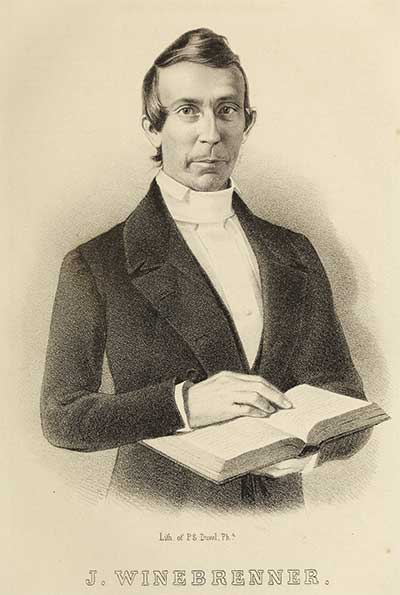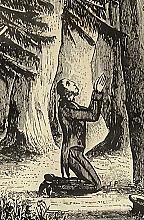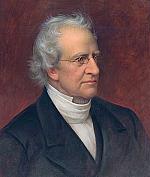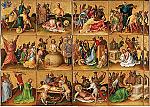Foils, foes, and friends

[P.S. Duval (engraver), Portrait of J. Winebrenner in History of All the Religious Denominations in the United States, ed. John Winebrenner—Princeton Theological Seminary Library / Public domain, Internet Archive]
AUGUST NEANDER (1789–1850), FATHER OF MODERN CHURCH HISTORY
August Neander was born David Mendel to a Jewish family. Deserted by his father, he received an education through the aid of patrons and friends. Neander experienced a dramatic conversion to Christianity in 1806, which deeply impacted every aspect of his life. (His brothers, sisters, and mother followed in his footsteps and also became believers soon after.) He studied with Friedrich Schleiermacher, who influenced Neander’s idea that history is the development of an internal spiritual life. Neander illuminated the religious lives of the major actors in the church and how those lives are manifested in the church’s growth. The church is a growing thing, he believed, and even heretics contribute to that growth. The life of the church gives evidence of the spiritual truth of Christianity.
Neander focused particularly on the biblical and historical foundations of Christianity. Beginning his academic career at the University of Heidelberg in 1811, he later joined Schleiermacher at the newly created University of Berlin (1813), where he taught New Testament, church history, and (later) systematic theology. He quickly became one of the most popular lecturers there.
Neander never married and devoted his adult life to scholarship and the cause of the church. His major work, General History of the Christian Religion and Church (1825), chronicled church history up to the Reformation and was published in six volumes. At the end of his life, progressive blindness impeded his ability to work, and he died in 1850. His contributions, however, lived on. Philip Schaff praised Neander as the “father of modern church history.”
KARL ULLMANN (1796–1865), DEFENDER OF THE GOSPEL
Karl Ullmann followed in the footsteps of Neander by embracing evangelical Protestantism and leading the cause of mediating theology. Ullmann was a part of the United Evangelical Protestant Church of the Grand Duchy of Baden—an 1821 union of Lutheran and Reformed churches that grew in popularity during this time.
He became a professor at Heidelberg in 1821, moved to Halle in 1829, and returned to Heidelberg in 1836. We don’t know if he married; we do know of his close brotherly friendship with poet and preacher Gustav Schwab, probably resulting from shared student experiences at Tübingen. He is described as a Christian humanist, not an original thinker, and was noted for his kind and approachable demeanor.
His essay Das Wesen d. Christenthums (“The Nature of Christianity”) attempted to show the “essence” of Christianity. (Nevin published a condensed translation of this work in The Mystical Presence.) It surveyed the interpretations of Kant, Hegel, and the later Hegelians, and supported John Nevin’s conviction that Christianity is not primarily doctrine or morality, but a life—the unity of divinity and humanity in Jesus Christ.
CHARLES HODGE (1797–1878), CRITIC OF MERCERSBURG
Charles Hodge was a preeminent theologian in the nineteenth-century Presbyterian Church. He spent his entire teaching career at Princeton Seminary, with two years off to study in Europe (1826–1828). Nevin substituted for him at Princeton during those years. In spite of this close connection between them, Hodge would become a major critic of Nevin’s Mercersburg theology. He criticized Nevin’s emphasis that “Christianity is a life,” believing this tended toward pantheism.
Hodge was also a proponent of common sense realism. For him theology was the logical explanation and organization of the teachings of the Bible, verbally inspired and therefore infallible, and analogous to natural science. One studied the facts (nature, the Bible) and organized those facts into a system. His Systematic Theology (1872–1873), continues to be studied in conservative Presbyterian circles.
Hodge expressed his theological conservatism in the infamous declaration that “a new idea never originated in this seminary.” At the same time, he was known for his warm and deeply emotional piety, communicated to his students in Sunday afternoon addresses. Hodge married a great-granddaughter of Benjamin Franklin in 1822. Two of his sons later taught at Princeton Seminary.
JOHN WINEBRENNER (1797–1860), NEVIN’S FOIL
John Winebrenner was an American revivalist and religious publisher. Raised in the German Reformed Church, he felt called to ministry and studied at Old Race Street Church in Philadelphia. In 1820 the Reformed Synod ordained Winebrenner and gave him the charge of the Salem Reformed Church in Harrisburg, Pennsylvania.
Winebrenner wanted to bring New Measures revivalism into Salem (see pp. 26–29), but the vestry resisted his attempts. In 1825 he and his supporters left to form their own church. His preaching throughout Pennsylvania and Maryland drew many converts from the German Reformed Church, who formed the “Church of God.”
He claimed that “Church of God” was the only true name of the church, and only it had reestablished the true, primitive, and apostolic church. Like other revivalists he was a social reformer, advocating for a greater role for women in the church, for abolition of slavery, and for the temperance and peace movements.
Winebrenner served as a significant foil for John Nevin. In 1842–1843 Winebrenner objected to Nevin’s negative evaluation of his denomination and use of New Measures. He wanted Nevin’s respect, and Nevin was not inclined to give it. In 1848 Winebrenner revised a pre-existing work, History of All Denominations in the United States. Nevin saw this collection of essays as an expression of rampant sectarianism. He critiqued it—as well as Winebrenner’s role in publishing it—in 1849 in his article “The Sect System.”
FRIEDRICH AUGUST THOLUCK (1799–1877), PIETIST, PREACHER, AND TEACHER
Friedrich August Tholuck was a German Protestant theologian and preacher. After 1826 he spent his entire career at Halle University. Neander and Schleiermacher converted him from skepticism, and his friendship with Moravians helped him see the need for inner awakening and a vital spiritual life. According to Schaff he adopted the motto of Zinzendorf, “I have but one passion, and that is He, and He alone.” He was a pietist and evangelical who helped move German theology away from Hegel.
His greatest influence was through his personal interaction with students (he had no children). He would take walks with them, invite them to meals, and engage them in intellectual discussion and debate. Both Schaff and Hodge spent time with him in this way.
HORACE BUSHNELL (1802–1876), PROTESTANT MODERNIST
Horace Bushnell was a Congregationalist pastor and theologian. Although his mother desired him to become a pastor, he lost his faith and turned to law at Yale. In 1831 a revival moved through the college. Bushnell’s “unregenerate” state led to a spiritual crisis resulting in a conversion experience, and he began studies at Yale Divinity School. In 1833 he was ordained pastor at North Church in Hartford, Connecticut.
His view of religious experience was always at odds with the Puritan heritage that prevailed in New England. His 1847 work Christian Nurture questioned the need for a dramatic religious experience and said that a child could be expected to grow up Christian. Bushnell also rejected using reason and logic to dispute theology. He believed that theological language is primarily symbolic and poetic, and he applied this method to major Christian doctrines.
Bushnell resigned his pastorate in 1861 due to health. He is considered a source of Protestant modernism and the social gospel.
ISAAK AUGUST DORNER (1809–1884), FACE OF MEDIATING THEOLOGY
Isaak August Dorner became a professor in 1838 at Tübingen. Another professor there was David Friedrich Strauss, who had written The Life of Jesus, arguing that the Gospels, especially the miracle stories, were myths. Dorner responded by declaring that not only is Jesus’s life as recorded in the Gospels historical fact, it is the overarching fact of the Christian life as developed in the history of the church.
Dorner’s understanding of the life and person of Jesus set him against some at Tübingen, but also set him apart as a theologian and historian. He rose quickly in influence as he developed his Christology, his historical and systematic works exemplifying his commitment to mediating theology. He published his arguments in History of the Development of the Doctrine of the Person of Christ (1861).
Dorner would go on to teach in multiple German universities. He ended his career at Berlin where he served as a member of the council of the Evangelical State Church in Prussia. He died in 1884, known as one of the foremost representatives of mediating theology.
FREDERICK AUGUSTUS RAUCH (1806–1841), FATHER OF IDEALIST PHILOSOPHY IN AMERICA
Frederick Augustus Rauch was born in Germany. Both his father and maternal grandfather were German Reformed pastors. Initially his studies were in philology (critical study of Greek and Latin texts), but after receiving his doctorate, his interests changed to philosophy. However, a dispute with a senior faculty member cut his fledgling academic career short, and he fled to America to start a new life.
He found his way to the large German community in southeastern Pennsylvania, settling down at the classical college and seminary of the German Reformed Church (eventually located in Mercersburg). Nevin joined him there in the spring of 1840. Rauch’s health rapidly declined (partially from overwork), and he died on March 2, 1841. His lecture notes were the basis of his major work, Psychology (1840), in which he stated a Hegelian-based idealistic philosophy.
J. H. A. BOMBERGER (1817–1890), SUPPORTER AND OPPONENT
J. H. A. Bomberger was the first graduate of Marshall College (1837) after its move to Mercersburg. He was a faithful son and active minister of the German Reformed Church, most notably at the Old Race Street Church in Philadelphia (1854–1870). He served as president of the Board of Home Missions and in parachurch societies such as the American Bible Society.
He supported Mercersburg thought in the church for two decades. In January 1853 he wrote a long, two-part essay on “Dr. Nevin and His Antagonists,” responding to charges of theological error. He chaired the committee (1848–1849) that began the decades-long process of writing a new church liturgy, bringing a poetic sensibility and skill as an editor.
However, he became the spokesman for many “evangelical” German Reformed pastors who believed that the new liturgy was too ritualistic and failed to build on historical Reformed resources. The essence of his argument is expressed in the titles of two polemics—The Revised Liturgy: A History and Criticism of the Ritualistic Movement in the German Reformed Church and Reformed, Not Ritualistic: Apostolic, Not Patristic (both 1867).
In 1870 this segment of the leadership formed a new college to represent its interests and vision, Ursinus College (Collegeville, Pennsylvania). Bomberger became its first president and served there until his death. CH
By David W. Layman
[Christian History originally published this article in Christian History Issue #155 in 2025]
David W. Layman is a retired lecturer in religious studies and philosophy and a general editor of the Mercersburg Theology Study Series.Next articles
Perspectives on Mercersburg
A theological roundtable
Jennifer Woodruff Tait, William B. Evans, John H. Armstrong, and the editorsRecommended resources: Mercersburg movement
Learn more about the Mercersburg movement’s main figures, critics, influences, and legacy with these recommendations from Christian History’s authors and editors.
the authors and editorsQuestions for reflection: Mercersburg movement
Questions to help you reflect on the legacy of the Mercersburg movement
the editorsDid you know? What Happened to the Apostles?
Though often creatively hyperbolic and of dubious origins, apostolic legends have inspired believers through the ages
the editors







